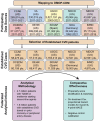This is a preprint.
Comparative Effectiveness of Second-line Antihyperglycemic Agents for Cardiovascular Outcomes: A Large-scale, Multinational, Federated Analysis of the LEGEND-T2DM Study
- PMID: 38370787
- PMCID: PMC10871374
- DOI: 10.1101/2024.02.05.24302354
Comparative Effectiveness of Second-line Antihyperglycemic Agents for Cardiovascular Outcomes: A Large-scale, Multinational, Federated Analysis of the LEGEND-T2DM Study
Update in
-
Comparative Effectiveness of Second-Line Antihyperglycemic Agents for Cardiovascular Outcomes: A Multinational, Federated Analysis of LEGEND-T2DM.J Am Coll Cardiol. 2024 Sep 3;84(10):904-917. doi: 10.1016/j.jacc.2024.05.069. J Am Coll Cardiol. 2024. PMID: 39197980 Free PMC article.
Abstract
Background: SGLT2 inhibitors (SGLT2is) and GLP-1 receptor agonists (GLP1-RAs) reduce major adverse cardiovascular events (MACE) in patients with type 2 diabetes mellitus (T2DM). However, their effectiveness relative to each other and other second-line antihyperglycemic agents is unknown, without any major ongoing head-to-head trials.
Methods: Across the LEGEND-T2DM network, we included ten federated international data sources, spanning 1992-2021. We identified 1,492,855 patients with T2DM and established cardiovascular disease (CVD) on metformin monotherapy who initiated one of four second-line agents (SGLT2is, GLP1-RAs, dipeptidyl peptidase 4 inhibitor [DPP4is], sulfonylureas [SUs]). We used large-scale propensity score models to conduct an active comparator, target trial emulation for pairwise comparisons. After evaluating empirical equipoise and population generalizability, we fit on-treatment Cox proportional hazard models for 3-point MACE (myocardial infarction, stroke, death) and 4-point MACE (3-point MACE + heart failure hospitalization) risk, and combined hazard ratio (HR) estimates in a random-effects meta-analysis.
Findings: Across cohorts, 16·4%, 8·3%, 27·7%, and 47·6% of individuals with T2DM initiated SGLT2is, GLP1-RAs, DPP4is, and SUs, respectively. Over 5·2 million patient-years of follow-up and 489 million patient-days of time at-risk, there were 25,982 3-point MACE and 41,447 4-point MACE events. SGLT2is and GLP1-RAs were associated with a lower risk for 3-point MACE compared with DPP4is (HR 0·89 [95% CI, 0·79-1·00] and 0·83 [0·70-0·98]), and SUs (HR 0·76 [0·65-0·89] and 0·71 [0·59-0·86]). DPP4is were associated with a lower 3-point MACE risk versus SUs (HR 0·87 [0·79-0·95]). The pattern was consistent for 4-point MACE for the comparisons above. There were no significant differences between SGLT2is and GLP1-RAs for 3-point or 4-point MACE (HR 1·06 [0·96-1·17] and 1·05 [0·97-1·13]).
Interpretation: In patients with T2DM and established CVD, we found comparable cardiovascular risk reduction with SGLT2is and GLP1-RAs, with both agents more effective than DPP4is, which in turn were more effective than SUs. These findings suggest that the use of GLP1-RAs and SGLT2is should be prioritized as second-line agents in those with established CVD.
Funding: National Institutes of Health, United States Department of Veterans Affairs.
Keywords: Cardiovascular Diseases; Comparative Effectiveness Research; Diabetes Mellitus; Glucagon-Like Peptide-1 Receptor Agonists; Hypoglycemic Agents; Sodium-Glucose Transporter 2 Inhibitors; Type 2.
Figures




References
-
- Prattichizzo F, La Sala L, Rydén L, et al. Glucose-lowering therapies in patients with type 2 diabetes and cardiovascular diseases. Eur J Prev Cardiol 2019; 26: 73–80. - PubMed
-
- Ansari MA, Chauhan W, Shoaib S, et al. Emerging therapeutic options in the management of diabetes: recent trends, challenges and future directions. Int J Obes 2023; : 1–21. - PubMed
-
- Pablo A, Evelyn B, Claudia F, Yanina MA. GLP-1RA and SGLT2i: Cardiovascular Impact on Diabetic Patients. Curr Hypertens Rev 2021; 17: 149–58. - PubMed
-
- Andrikou E, Tsioufis C, Andrikou I, Leontsinis I, Tousoulis D, Papanas N. GLP-1 receptor agonists and cardiovascular outcome trials: An update. Hellenic J Cardiol 2019; 60: 347–51. - PubMed
-
- Hernandez AF, Green JB, Janmohamed S, et al. Albiglutide and cardiovascular outcomes in patients with type 2 diabetes and cardiovascular disease (Harmony Outcomes): a double-blind, randomised placebo-controlled trial. Lancet 2018; 392: 1519–29· - PubMed
Publication types
Grants and funding
LinkOut - more resources
Full Text Sources
